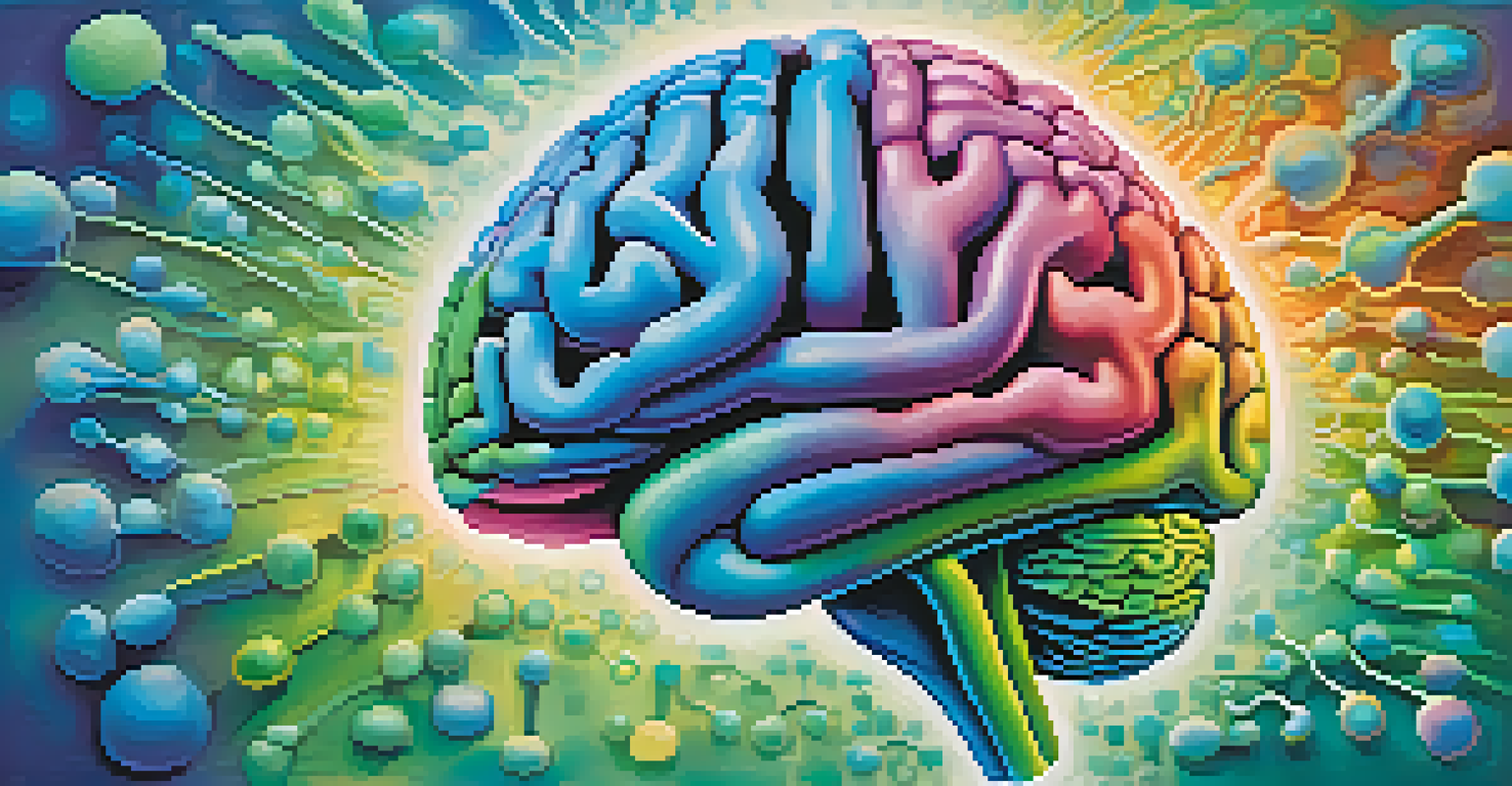The Potential of Hallucinogens in Managing Autism Spectrum Disorder

Understanding Autism Spectrum Disorder: A Brief Overview
Autism Spectrum Disorder (ASD) is a complex developmental condition that affects communication, behavior, and social interaction. It's often characterized by a wide range of symptoms and varying levels of severity, which can make it challenging to find effective management strategies. Many individuals with autism experience difficulties in sensory processing, emotional regulation, and social connections, leading to a unique set of challenges in daily life.
The greatest discovery of my generation is that a human being can alter his life by altering his attitudes.
Traditional therapies for ASD usually include behavioral interventions, speech therapy, and occupational therapy. While these approaches can be beneficial, they may not work for everyone, prompting researchers to explore alternative treatments. Among these alternatives, hallucinogens have emerged as a point of interest, sparking curiosity about their potential in supporting individuals with autism.
Understanding the intricacies of ASD is crucial when considering any new treatment methods. As we delve deeper into the possibilities of hallucinogens, we must keep in mind the unique experiences and needs of those on the autism spectrum.
What Are Hallucinogens? A Simple Explanation
Hallucinogens are substances that can alter perception, mood, and various cognitive processes. They are often categorized into two main types: classic hallucinogens, like LSD and psilocybin (found in magic mushrooms), and dissociative drugs, such as ketamine. These substances can lead to profound changes in consciousness, which some researchers believe may have therapeutic potential when applied in a controlled setting.

The idea of using hallucinogens for therapeutic purposes isn't entirely new. In fact, these substances have been used in traditional practices for centuries, often in spiritual or healing contexts. However, modern science is now revisiting the potential benefits of hallucinogens, particularly in the field of mental health and neurodevelopmental disorders.
Exploring Hallucinogens for ASD
Research is investigating the potential of hallucinogens to support individuals with Autism Spectrum Disorder by enhancing emotional well-being and social interactions.
By understanding what hallucinogens are and how they work, we can better assess their role in managing conditions like autism. The key lies in how these substances may influence brain function and emotional processing, potentially offering new avenues for support.
The Science Behind Hallucinogens and Autism
Research into the effects of hallucinogens on the brain has revealed their ability to promote neuroplasticity, which is the brain's capacity to reorganize itself by forming new neural connections. This is particularly intriguing for individuals with autism, as improved neuroplasticity could lead to enhanced learning and adaptability. Some studies suggest that hallucinogens may help in breaking down rigid thought patterns and fostering more flexible thinking.
The mind is everything. What you think you become.
Additionally, hallucinogens have been shown to alter emotional responses and reduce anxiety in some individuals. For those with autism, who often face heightened anxiety and emotional dysregulation, this effect could be beneficial. By potentially lowering anxiety levels, hallucinogens might create a more conducive environment for therapy and social interaction.
However, it's important to note that research is still in its early stages. While the initial findings are promising, further studies are needed to understand the full scope of hallucinogens' effects on autism and to ensure their safety and efficacy for this population.
Current Research: Studies Exploring Hallucinogens and ASD
A growing body of research is beginning to explore the use of hallucinogens in treating autism. Some studies have focused on the effects of psilocybin in small groups of individuals with ASD, observing changes in emotional well-being and social interactions. These early findings suggest that, under the right conditions, hallucinogens could offer valuable support to those on the spectrum.
For example, a study involving adults with autism found that those who participated in guided psilocybin sessions reported increased emotional openness and reduced symptoms of anxiety. These positive experiences highlight the potential of hallucinogens as an adjunct to traditional therapies, rather than a standalone treatment.
Importance of Guided Therapy
Guided therapy is essential for safely navigating hallucinogen use, providing individuals with autism the emotional support needed to maximize therapeutic benefits.
While the results are encouraging, researchers emphasize the need for larger, more rigorous clinical trials to validate these findings. Understanding how hallucinogens can be safely integrated into treatment plans is essential for ensuring that individuals with autism can benefit from these innovative approaches.
The Role of Guided Therapy in Hallucinogen Use
Guided therapy plays a crucial role in the effective and safe use of hallucinogens. In therapeutic settings, trained professionals facilitate sessions that help individuals navigate their experiences and emotions while under the influence of these substances. This supportive structure is especially important for individuals with autism, who may require additional guidance in processing their feelings and reactions.
During guided sessions, therapists can create a safe environment, allowing participants to explore their thoughts and feelings without judgment. This can lead to meaningful insights and breakthroughs that might not occur in traditional therapy settings. The combination of hallucinogens and guided therapy aims to enhance emotional healing and personal growth.
Integrating guided therapy into hallucinogen use ensures that individuals are not only experiencing the effects of the substance but also receiving the emotional support needed to maximize their therapeutic potential. This holistic approach is essential for anyone considering hallucinogens for autism management.
Addressing Concerns: Safety and Ethical Considerations
As with any treatment, safety is a paramount concern when considering the use of hallucinogens for autism. The potential for adverse effects, particularly in individuals with existing mental health conditions, must be carefully evaluated. Open discussions about risks, benefits, and individual circumstances are essential to ensure informed decision-making.
Ethical considerations also come into play, especially regarding consent and the vulnerability of individuals with autism. It's vital that treatment options are approached with sensitivity and respect for the autonomy of those on the spectrum. All participants should be fully educated about the potential effects of hallucinogens and given the opportunity to voice their preferences.
Safety and Ethical Considerations
Ensuring safety and addressing ethical concerns are crucial when considering hallucinogens in treatment for autism, highlighting the need for informed decision-making.
By prioritizing safety and ethical practices, researchers and practitioners can create a responsible framework for exploring the use of hallucinogens in autism treatment. This careful approach will help pave the way for more informed, compassionate, and effective care.
Future Directions: What Lies Ahead for Hallucinogens and Autism
The future of hallucinogens in managing autism spectrum disorder is still unfolding, but the potential is undeniably exciting. As research progresses, we may see more concrete evidence supporting the therapeutic benefits of these substances. This could lead to new treatment protocols that integrate hallucinogens with established therapies, offering a more comprehensive approach to autism management.
In addition, advancements in technology and neuroscience may provide deeper insights into how hallucinogens interact with the brain, specifically in individuals with autism. This understanding could help refine treatment methods and tailor them to meet the unique needs of this population.

Ultimately, the exploration of hallucinogens as a management tool for autism is a journey worth pursuing. With continued research, open dialogue, and a focus on safety and ethics, we may unlock new possibilities for enhancing the quality of life for individuals with autism spectrum disorder.